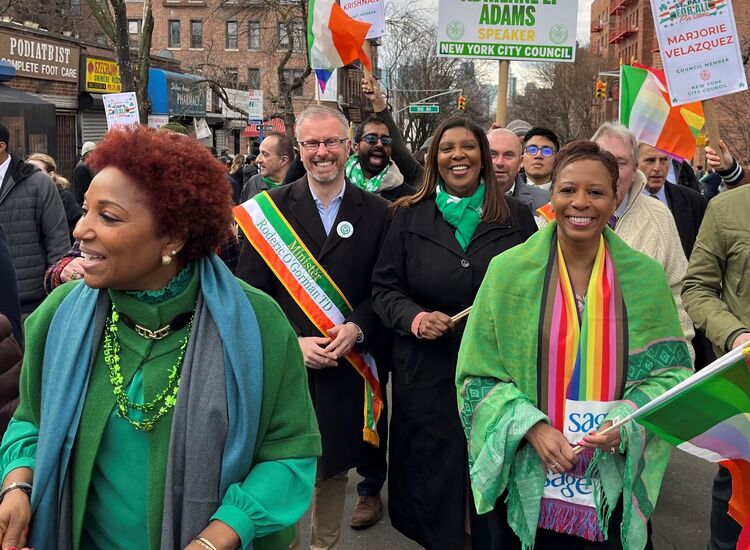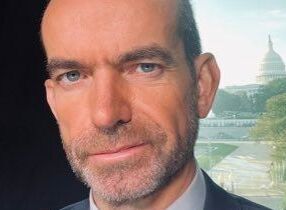[caption id="attachment_71823" align="aligncenter" width="600" caption="Bishop John Hughes. "]
During the height of his tumultuous reign as bishop of New York in the mid-19th Century, John Hughes found himself struggling with some fellow Catholics who seemed just a little too quick to act and think on their own.
For Hughes, a native of County Tyrone, disorder and chaos simply could not be tolerated. The Catholic Church was too weak, and nativism too strong, in pre-Civil War New York. Any sign of dissent within the ranks was an open invitation for the church's enemies to attack. At least, that's how Hughes saw it.
So, when nuns from the Sisters of Charity informed Hughes that they would no longer administer an orphanage for boys in New York, the bishop hit the ceiling. Decisions about church institutions were his to make, not theirs.
The chain of command was clear: The orphanage was located in the diocese of New York; he, John Hughes, was the bishop of New York, therefore, he, and only he, would decide whether or not the sisters would continue to staff the orphanage.
Hughes fired off a letter to Sister Rosalia Green, who was in charge of the order's New York mission. Essentially, he told the nun that it was his way or the highway.
"I wish and request and require that you leave the diocese of New York with as little delay as possible," Hughes wrote.
"I shall tolerate no officer of a religious community, male or female, exercising without my previous advisement and consent, powers of disturbance and embarrassment, such as have been exercised ... in my diocese of late."
Some of the Sisters of Charity left forthwith, but most, including the bishop's sister Angela, chose to remain in New York - under Hughes' authority.
This forgotten episode was part of a larger power struggle in the American Catholic church in the 1840s and '50s. If it sounds familiar, it should. Some power struggles never seem to go away.
The Vatican and some bishops in the U.S. share with old Dagger John Hughes a similar attitude toward nuns. The good sisters are to be seen - in schools, in hospitals, and in other social service institutions - but not heard. They are there to serve, not to think. And they certainly should entertain no doubt about the source of ultimate authority.
Here's the difference: In 1846, the predominately Irish clerics who led the Catholic Church in the U.S. saw themselves and their fellow Catholics as an embattled minority. Ranks had to be closed and authority had to be respected. Otherwise, catastrophe would surely follow.
More than 150 years later, Catholics in America are part of the mainstream. Violent nativism is a thing of the past, and, more to the point, the moral authority of the bishops, whether in the U.S. or in Ireland, has virtually disappeared.
And for that, the bishops have only themselves to blame. The best of them know that.
The Vatican's recent scolding of American nuns has had the unintended but welcome effect of emphasizing all the good work that these women have accomplished in the U.S. and elsewhere for many decades.
For far too long, nuns in the U.S. have been portrayed as sadists who were quick to crack knuckles with a ruler, or to slap around misbehaving third-graders.
Now, however, as they come under assault for paying too much attention to the poor, Catholics of the practicing and lapsed variety are coming to the nuns' defense. Journalists in the nation's top newspapers have written pieces extolling the work of nuns among the poor in the U.S. and around the globe.
The crackdown has become yet another public relations nightmare, made even worse after the Boston Globe reported that the man behind the crackdown may have been none other than Boston's disgraced former archbishop, Cardinal Bernard Law.
If Law had anything to do with the crackdown, if, in fact, his opinion still matters to anybody in the Vatican, things are even worse for the church than most people believe.
Cardinal Law, you will remember, had to quit his post when it became clear that he routinely transferred pedophile priests from parish to parish, rather than report them to secular authorities.
When the Globe began to uncover the abuse scandal more than a decade ago, Law said the paper was anti-Catholic. Law is now in Vatican City, beyond the reaches of U.S. law enforcement. The man should spend the rest of his days performing penance, not telling the Vatican to crack down on all those nuns in America.
The bishops in the U.S. were put out because American nuns thought there was a lot to be said about President Obama's health-care reforms. The bishops, on the other hand, despised the law and campaigned against it.
The Vatican told the nuns that the bishops, not the nuns, were "the church's authentic teachers of faith and morals."
And how, exactly, has that been working out?








